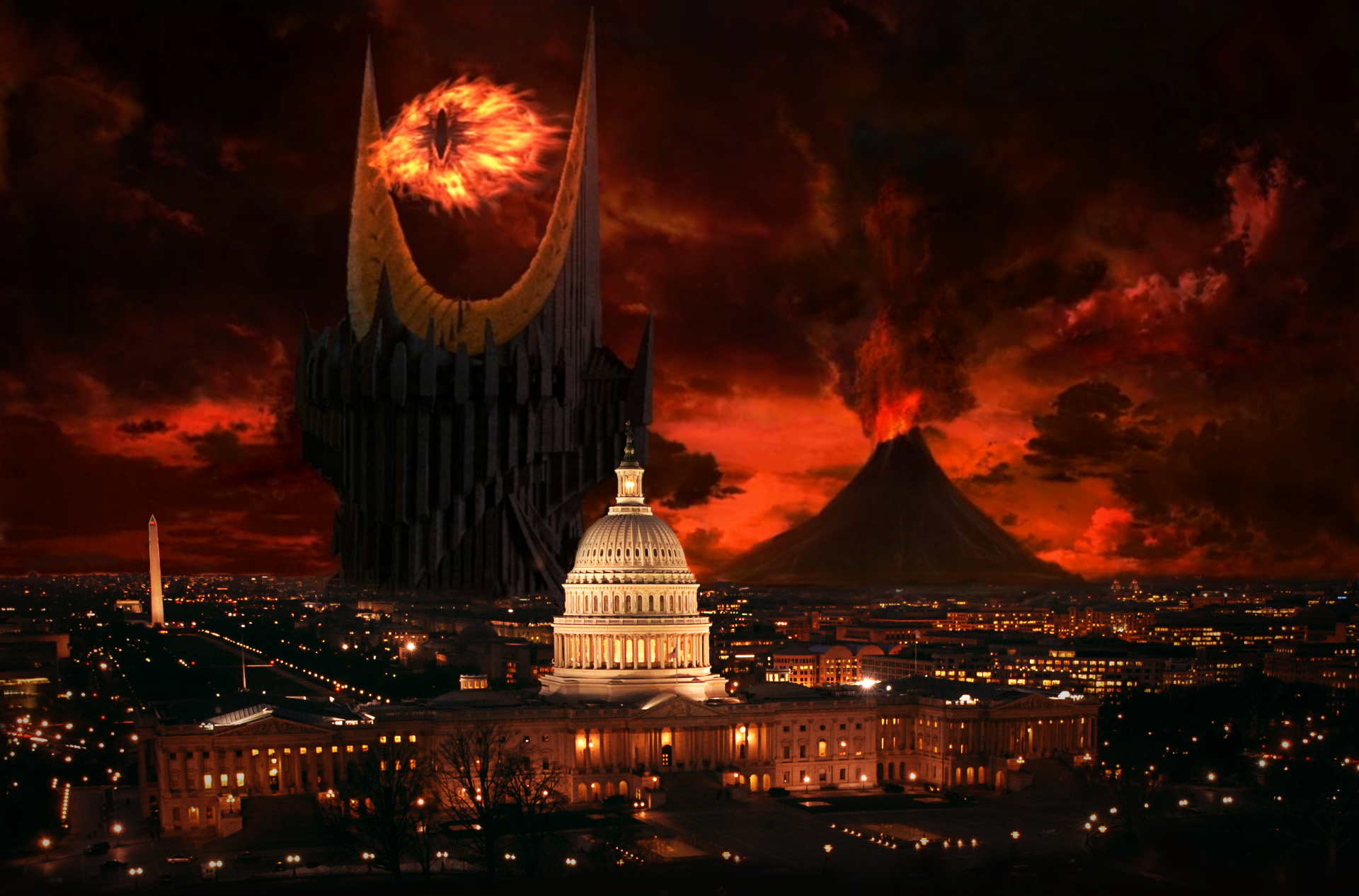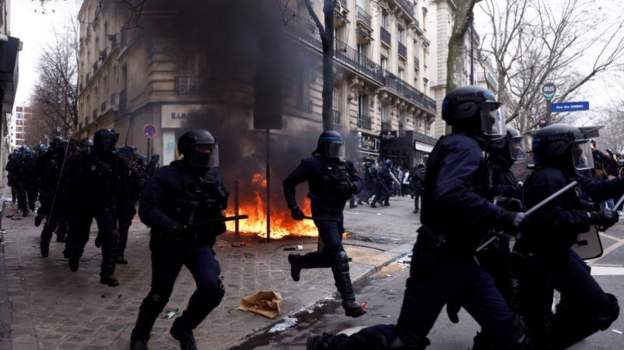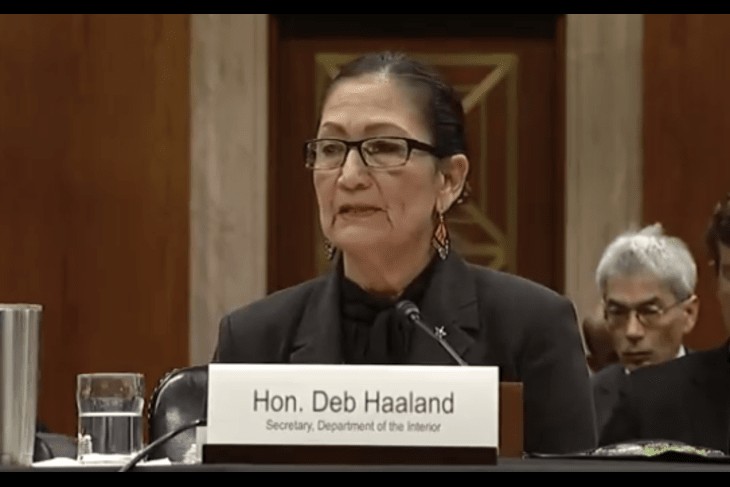Here’s how the war could play out in the 2024 presidential campaign.

For most of the first year of Russia’s war in Ukraine, U.S. politics “stopped at the water’s edge”—an adage that conveys the tendency for foreign policy to be more bipartisan than domestic policy. While showing some soft spots, consensus on the war—and robust U.S. support of Ukraine—largely prevailed. Not anymore. The issue of how involved the United States should be has begun spilling over into congressional and Republican presidential primary politics, and likely will be a factor in the 2024 presidential election.
Some of this is genuine policy debate. Indeed, in some instances when politics has been too quick to stop at the water’s edge—Vietnam in the 1960s, Iraq in 2003—deeply flawed policies have resulted. No lesser than Joint Chiefs of Staff Chairman Gen. Mark Milley has raised questions about the prospect of a Ukrainian military victory. The resolutely centrist RAND think tank asked, “How does this end?” and journals and magazines such as Foreign Policy are running articles with a range of views as to optimal U.S. strategy.
But while there is some substantive debate going on, the partisan politics have intensified.
When the war first started, support for Ukraine was strikingly bipartisan. Chicago Council on Global Affairs polling last March showed sanctions against Russia getting 82 percent support from Democrats and 75 percent from Republicans; arms and other material assistance to Ukraine 83 percent and 80 percent; and Ukrainian economic assistance 85 percent and 74 percent. The partisan split widened a bit in July 2022, but only a bit, with Republican leaders becoming more critical of Biden but still cautiously so.
But by November 2022, as election season hit, the spreads got wider: Arms and material assistance had 76 percent Democrat and 55 percent Republican support, from a 3-point gap to a 21-point one; and economic assistance had 81 percent Democrat and 50 percent Republican support, an 11- to 31-point gap. Support for sanctions against Russia was still pretty bipartisan, at 83 percent of Democrats and 73 percent of Republicans; the gap only increased from 7 to 10 points. But in answer to a question about supporting Ukraine despite higher gas and food prices, Republican support fell from 50 percent in July to 33 percent in November, while Democrats only went from 69 percent to 61 percent. Here, the gap went from 19 to 31 points.
Committee hearings already have gotten more abrasive in the House of Representatives, with confrontational questioning of Biden administration officials. The supplemental appropriation the Biden administration may soon need risks rough waters, too; as a January 2023 CBS News poll showed, while overall Republican support for more Ukrainian aid was 64 percent, among self-identified “MAGA” (Make America Great Again) Republicans it was only 36 percent. While Senate Republicans such as Minority Leader Mitch McConnell and Foreign Affairs Committee Ranking Member Jim Risch have been trying to counter with statements of support for Ukraine, the war was one of the issues on which House Speaker Kevin McCarthy made pledges to hard-right members of his caucus in order to gain his position.
Ramping up even further, Rep. Marjorie Taylor Greene—who during the 2022 election alleged an FTX-related cryptocurrency conspiracy, claiming Ukrainian military aid was being funneled to Democrat campaigns—said at the early March Conservative Political Action Committee (CPAC) confab that Ukrainian President Volodymyr Zelensky “wants our sons and daughters to go die there.”
In the last month, all-but-declared presidential candidate and current Florida Governor Ron DeSantis brought Ukraine squarely into the Republican primary race. His statement to Tucker Carlson posing the issue as just a “territorial dispute” between Ukraine and Russia, not an invasion by the latter of the former, and not a vital U.S. interest, was clearly intended to compete with former President Donald Trump for the MAGA primary vote. DeSantis made the Ukraine conflict conversation his own version of America First—contending that all those billions should be spent at home and the weapons be kept for defending the United States’ own southern border from “narcotics smuggled” and the like. And he checked off the China hawk box, deriding Russia as a “third-rate” threat that should not distract us from the ominous Big Threat. But DeSantis obviously felt he needed to respond to the ensuing Republican establishment outcry; he softened the edges of his statements by labeling Putin a war criminal and re-invoking the claim from earlier in his career of being Reaganite tough on Russia.
Former South Carolina Gov. Nikki Hayley, a declared presidential candidate, has tried to capitalize on the criticism of DeSantis and lay claim to at least a degree of more traditional Republican conservative internationalism. This, though, is where the current Republican party differs from its Cold War-era “peace through strength” predecessor, when internationalist presidential aspirants prevailed over isolationist ones. In 1952, for instance, Gen. Dwight D. Eisenhower defeated “steadfast isolationist” Ohio Sen. Robert A. Taft for the party nomination. In 1992, George H. W. Bush prevailed over Patrick Buchanan (a nativist and isolationist in a number of assessments). But in 2016, a whole coterie of conservative internationalists competing for the Republican presidential nomination—Marco Rubio, Jeb Bush, Ted Cruz, Lindsey Graham—were left in the dust by Trump’s America First.
Whoever emerges as the Republican candidate, they are more likely to be in the Ukraine critic lane than the supporter one. And that may have some advantages for the party in the general election.
In the past year, survey questions about Ukraine that explicitly identified policies as Biden’s got much lower approval than those about just the policies themselves. In a May 2022 University of Maryland poll, “U.S.” policies got higher approval than “Biden Administration” policies. An October 2022 Reuters/Ipsos poll similarly showed 66 percent approval for Ukrainian weapons aid and 59 percent approval for financial aid, but only 46 percent approval for “the way Joe Biden is handling [Ukraine].” Even keeping the questions political but taking Biden out of them, 69 percent supported pro-Ukrainian military aid congressional candidates in the then-upcoming midterm elections.
How Ukraine affects the 2024 presidential general election is contingent on three potential scenarios—one of which could help Biden, but only a bit, while the other two could hurt him quite substantially.
1. Ukraine wins. Let’s take this to mean the war ends, Russia withdraws its forces to the pre-invasion lines, the 2014 Crimea annexation may or may not be reversed, and the peace agreement reached is generally seen as robust and durable. Biden could rightly claim success, and that his policy was a critical factor. But foreign-policy victories often do little to help presidential re-election bids. In 1992, then-President George H. W. Bush lost reelection despite the major 1991 Gulf War victory. In 2004, public opinion was still largely supportive of the Iraq War and Democrat candidate John Kerry had many weaknesses, but incumbent George W. Bush only got narrowly reelected. Indeed, in a number of other recent elections—2000, Al Gore vs. George W. Bush; 2008, Barack Obama vs. John McCain; 2016, Trump vs. Hillary Clinton—the candidate who is stronger on foreign policy has been defeated.
2. Ukraine loses. The Biden administration’s policies would be criticized as both too little and too much, with the Republican candidate likely making both arguments. Had the United States and NATO done more and done it sooner, Russia would not have prevailed. By doing only what it did, Washington ended up wasting U.S. taxpayers’ money.
3. War persists. Biden could credibly claim that Ukraine continuing to hold its own validates his policy. The little guy against the big guy. Wars do go on for years. The course needs to be stayed. U.S. interests, values and reputation all are at stake, both directly in Ukraine and indirectly by the lessons China would draw.
Adding historical perspective, this would not be the first time that ending wars or keeping out of them was a winning position for a presidential candidate. Woodrow Wilson ran his 1916 reelection campaign on having kept the United States out of World War I since its start in 1914. While having taken some steps to prepare the country for war, Franklin D. Roosevelt calculated that he needed to promise in his 1940 re-reelection campaign not to send U.S. soldiers into battle. Richard Nixon’s touting of an ostensible secret peace plan for the Vietnam War was a key factor in his 1968 election victory (notwithstanding the fact that he was actively sabotaging the actual peace talks then going on). Obama’s promise to end the Iraq War was more politically potent than McCain’s commitment to win it. Trump was on record even before his 2016 presidential campaign that the war in Afghanistan was a “complete waste” and that it was “time to come home.”
Ukraine will not be the most important issue in 2024; that spot will likely be taken by domestic problems, culture wars, and personas. There’ll be some competitive China-hawking as well. But given margins such as 2020’s 0.23 percent in Georgia, 0.63 percent in Wisconsin, and 1.16 percent in Pennsylvania, if even a few percent of the electorate vote based on Ukraine, the marginal difference could be decisive.












